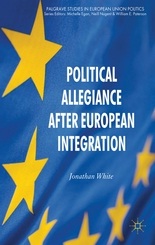Political Allegiance After European Integration
Jonathan WHITE
Disponibilité: En rupture de stock - disponible sous 10 jours
- Catégories: Citizenship, European Integration, Identités européennes
- Editeur: PALGRAVE-MACMILLAN
- ISBN: 9780230279780
- Date de publication: 08/04/2011
- Reliure: Hardback
- Nombre de pages: 288
Résumé
Decades of co-rule have left EU citizens with attachments more complex than labels like 'European' or 'national identity' would suggest. But what kind of ties should we be looking for? How can they be studied, and where does their democratic significance lie?
This book combines a conceptual elaboration of the political bond with a sociological study of commonsense suppositions, based on interviews with groups of taxi-drivers in Germany, Britain and the Czech Republic. The author investigates allegiance not in directly-solicited views on European matters but in the expectations and reference-points evoked spontaneously in political discussion. A willingness to take the transnational view on many issues is clear. But how those issues are understood raises doubts about their European dimensions and scepticism about the possibilities for addressing them. Without changes in the way politics is conceived, arguments for the European polity are likely to ring hollow, and with them the formal ties of EU citizenship.
Table des matières
Political Community and the Bonds of Collectivity
Studying the Allegiances of Europeans
Articulations of the Political Common
On Subjects, Opponents and Counterparts
The Credibility of Political Projects
The Place of Europe and the EU
European Integration off the Meter
Methodological Appendix
Bibliography
